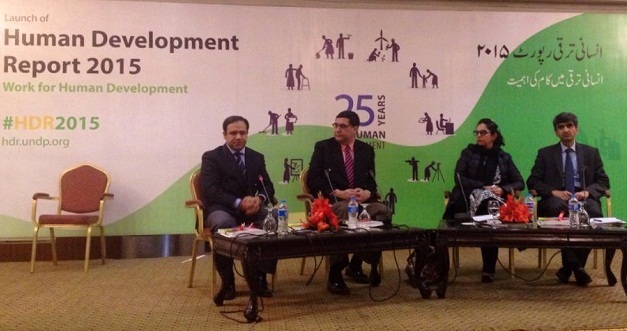With 2 billion people lifted out of low human development in last 25 years, now we must galvanize progress says 2015 Human Development Report.
LAHORE — Fast technological progress, deepening globalization, aging societies and environmental challenges are rapidly transforming what work means today. This new world of work presents great opportunities for some, but profound challenges for others. The 2015 Human Development Report (HDR), released by the United Nations Development Programme (UNDP) in Lahore, urges governments to act now to ensure no one is left behind in the fast-changing world of work.
“The 2015 HDR report is an urgent call to tackle one of the world’s great development challenges – providing decent work and livelihoods for all. With 64 percent of its population below the age of 30, it is vital for Pakistan to invest in gainful employment for young people and ensure that the workforce adapts to the rapidly changing demands of today’s world,” said Marc-André Franche, Country Director UNDP Pakistan.
The report, titled ‘Work for Human Development’, calls for equitable and decent work for all and encourages governments to consider the many kinds of work, such as unpaid care, voluntary or creative work, that are important for human development.
Human Development in Pakistan and South Asia
The findings of the upcoming Pakistan’s national report were presented by its lead author, Dr Adil Najam, Dean, Frederick S. Pardee School of Global Studies, Boston University. Other speakers included Dr. Faisal Bari, Associate Professor of Economics, LUMS, Jehanzeb Khan, Chairman of the Planning and Development department, Government of Punjab, Roshaneh Zafar, Managing Director of Kashf Foundation and Dr. Umar Saif, Vice Chancellor of the Information Technology University.
With a Human Development Index (HDI) value of 0.538, Pakistan ranks 147th out of 188 countries and territories. Pakistan ranks 121st out of 155 countries in terms of its Gender Inequality Index: only 19.3 percent of women reach secondary education compared to 46.1 percent of men, while female participation in the labour market is 24.6 percent compared to 82.9 percent for men.

South Asia’s HDI value of 0.607 is below the average value of 0.666 for the developing world. While there has been remarkable progress in life expectancy in South Asia, which has increased at almost twice the global rate since 1997, widespread deprivations persist. About 800 million people remain in multidimensional poverty in the region.
Youth unemployment in South Asia ranges from 3.5 percent in Nepal to 28.7 percent in Iran. Fostering education, skills and entrepreneurship can help to transform the labour market and access to information communications technology can help develop marketable skills and secure quality work opportunities. Yet, as of 2014, 1.4 billion people in South Asia still lacked access to the internet.
The 2015 HDR report urges countries and societies to promote decent work opportunities and sustainability by improving education, and social protection, particularly for vulnerable groups, and by engaging in collective action and protective legislation to eradicate exploitative or demeaning work.
Setting the new agenda for work
While policy responses to the new world of work will differ across countries, the 2015 HDR report argues that three main clusters of policies are critical for governments and societies adapting to the new world of work. It proposes a three-pronged action agenda:
- A new social contract ensuring that all members of society, especially those outside the formal sector, have their needs taken into account in policy formulation.
- A global deal among governments to guarantee workers’ rights and benefits.
- A decent work agenda which promotes freedom of association, equity, security, and human dignity in work.

